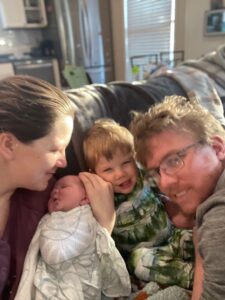
We all go through life watching tragedies unfold in people’s lives, thanking the gods or fate that it isn’t us.
But what happens when it is?
My son Dylan Jobsis grew up on St. Thomas and, after graduating from UVI, went on to serve the communities of St. Thomas and St. John in the tourism industry, working at LCCN (Love City Community Network) to restore and provide new internet connection in St. John after hurricanes Irma and Maria, and finally working as a Technology Coordinator at VIMSIA (Virgin Islands Montessori and International Academy). In 2021, he and his partner, Emma Landvatter, had a son, Cade Franco Jobsis.
From around 6 months old, Cade showed signs of developmental delay. He was missing what doctors call “milestones,” indications that a baby is normal, such as holding up his head, grasping, and sitting up. He was able eventually to achieve these early markers, and physicians and physical therapists told Emma and Dylan that Cade was just delayed, not to worry, that he would catch up.
When it became more and more obvious that there was something seriously wrong with Cade’s development, Dylan and his family left the VI to access a wider variety of diagnostic tests and treatment options.
A little over one year later, Emma sat with a genetic counselor in his office in Seattle. The geneticist told her that they had a diagnosis. Her heart sank. She knew it couldn’t be good.
It wasn’t.
Cade’s diagnosis was Hereditary Spastic Paraplegia, or SPG50, so named for its location on the strands of his DNA. More bad news followed. SPG50 is an “ultra rare” neurodegenerative disorder. The journal Nature, which just published an article on a new gene therapy for SPG50, describes the disorder thus:
Hereditary spastic paraplegia type 50 (SPG50) is a prototypical ultra-rare (affecting <1 in 50,000) disease, with fewer than 100 affected individuals identified3,4…. The disease is progressive, with loss of motor skills due to worsening spasticity, and is associated with serious morbidities3,11. By the second decade of life, most affected individuals are wheelchair dependent and manifest severe cognitive dysfunction. Lifespan is not fully established, but the disorder is considered life-limiting.
Thus, unless he receives treatment, this disorder slowly and ultimately will deprive my grandson of his ability to move and speak.
The pharmaceutical company that pioneered the gene therapy Cade needs, and that is now attempting to raise money to take it through Phase 3 clinical trials for FDA approval, was founded by the father of an SPG50 child. If the company makes it through Phase 3 clinical trials for the FDA, this treatment will be the first for ultra rare diseases to do so in the US.
Since leaving St. Thomas, Cade has been in intensive physical, occupational and now speech therapy. With the help of these professionals and his extremely dedicated parents, especially his mom Emma, Cade has learned to feed himself, to crawl, to stand, speak a few words, and to sign some others that he can’t. But these gains are only temporary.
For the gene therapy to be effective, it needs to be started as soon as possible. Cade is three years and 3 months old. If his family (and the 7 other families with children who need the treatment now) can raise $1.5 million, the Phase 3 trial can begin. Everything is in place for it to start: the location (the National Institutes of Health in Bethesda, MD), researchers, doctors, even food and lodging. The monies needed now are for costs associated with the trial, such as independent data analysis.
Cade, like every child, is precious, and not just to us, his family. He is, as I have told people since he first smiled, the happiest baby in the world. He fights hard, works hard to learn new skills, smiling and laughing all the way through his daily struggles. We, his parents and grandparents, have reached out to our extended family, friends, and communities for support, and now Cade’s grandfather, Paul Jobsis and I are holding a Concert for Cade fundraiser and silent auction at Tillett Garden on Saturday, July 20, starting at 6:30 pm, featuring the band Without Doubt VI. We hope to see you there! Help us save Cade!
-Rosalyn Rossignol is a retired English professor and resident of St. Thomas.


